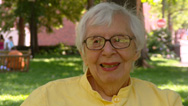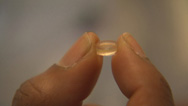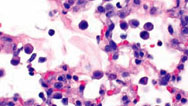Fighting HPV in Bhutan
- By Ari Daniel
- Posted 08.21.14
- NOVA
Human papillomavirus, or HPV, can cause cervical cancer. Bhutan is the first developing country to welcome the widespread vaccination of girls against HPV, and cervical cancer rates have dropped. Some countries have resisted the vaccine, but in Bhutan even the royal princess is onboard.
Transcript
Fighting HPV in Bhutan
Posted: September 5, 2014
NARRATOR: Far away, seemingly lost in time, is a place known for valuing the happiness and well being of its people.
The Himalayan Buddhist Kingdom of Bhutan has a unique way of life, measuring progress not by Gross Domestic Product but rather by Gross National Happiness—and treating disease with traditional remedies combined with modern medicines.
At school, children line up to pray to the God of Wisdom to help guide them in understanding.
But the lives of these children and their families are often interrupted by disease—cervical cancer is the biggest cancer threat to Bhutanese women.
Now there’s a way to protect these girls.
Australian scientist Ian Frazer spent 15 years developing the world’s first vaccine designed to stop a cancer. He and his wife Caroline have come to Bhutan, the first developing nation to embrace the vaccine.
FRAZER: I have been working on a vaccine that can protect against a different sort of infection, an infection that can cause the cancer. This is a virus that doesn’t make you ill when you get it, but if you have the virus infection for a long time it increases your risk of getting a cancer. But we now have a vaccine.
NARRATOR: The key is to vaccinate girls before they’re exposed to the virus.
FRAZER: Cervical cancer is the consequence of an infection we catch through sexual intercourse. If you’re one of the unlucky 2% who can’t clear the infection then you’re at significant risk of cancer some time during your lifetime.
Because cervical cancer is caused by an infection, we can use all the defenses that we normally use to prevent infection including vaccines, and we’re fortunate that we now have a very effective vaccine to help prevent about 70% of cervical cancer.
NARRATOR: The vaccine targets the virus that causes the cancer—known as HPV, or human papillomavirus.
It uses precise, state-of-the-art technology. Instead of delivering a weakened or dead form of the virus, it sends in a decoy. The outer shape resembles the real virus, but there’s no viral material inside.
This tricks the immune system into mounting the defense.
Preventing HPV infection not only stops cervical cancer—it can stop other diseases, like some oral and genital cancers. And today the vaccine is also being recommended for boys.
But with new vaccines, come new fears.
In Bhutan, the vaccine almost didn’t get the go ahead.
Two weeks before it was due to launch, a tragedy occurred next door in India, where every year, around 70,000 women die from cervical cancer.
TV JOURNALIST: In 2009, young girls in the tribal villages in the Khammam district were vaccinated with the HPV vaccine. Girls in the age bracket of ten to 15 years were targeted in remote villages, schools and hostels. And by the end of it, 14,019 girls had been vaccinated. But within six months, four of them died.
NARRATOR: There was a massive outcry. Thousands voiced their concerns about safety and ethics, and called on the government to halt the vaccine.
The story went viral, gaining global currency and power.
The four deaths were investigated.
It was announced that two girls died of poisoning, one of drowning, the fourth of a fever of unknown origin.
Few reported the new evidence.
FRAZER: What has happened to these immunized girls definitely has happened. They’re real events, but the evidence is that they are not associated with the vaccine.
NARRATOR: In 2010, the Indian government suspended the vaccine.
FRAZER: If even one of those deaths had been due to the vaccine, that would’ve been bad. No vaccine should kill someone. But the impact of not vaccinating the population of India is 70,000 cancer deaths a year.
NARRATOR: In Bhutan, the reports of the four girls’ deaths in India were examined at the highest levels, including the Royal Family.
After much consultation, the Bhutanese authorities chose to continue the rollout of the HPV vaccine. The threat of cervical cancer was too great.
ROYAL PRINCESS: We’re seeing many more cancer patients, and especially women, it’s very sad to see. It’s heartbreaking actually to see woman in their last stages and children near their bedsides. And I think it’s very important to do something about it.
Credits
- WRITTEN, DIRECTED AND PRODUCED BY
- Sonya Pemberton
- EXECUTIVE PRODUCERS
- Michael Rosenfeld
Sonya Pemberton - DIRECTOR OF PHOTOGRAPHY
- Harry Panagiotidis
- EDITORS
- Wayne Hyett A.S.E.
Mark Atkin A.S.E. - NARRATOR
- Sharon Washington
- SCIENTIFIC ADVISORS
- Joseph Buxbaum
Lauri Markowitz
Glen Nowak
Walter Orenstein - For Genepool Productions
- LINE PRODUCERS
- Josephine Wright
Malvina Martin
Roslyn Walker - DIRECTOR OF PRODUCTION
- Toni Malone
- ASSOCIATE PRODUCER
- Harry Panagiotidis
- ASSOCIATE PRODUCER/2ND UNIT DIRECTOR
- Faye Welborn
- PRODUCTION COORDINATOR
- Sally Storey
- SOUND RECORDISTS
- Martin Keir
Johnny Camillo
Anton Herbert
Paul Rusnak - RESEARCHERS
- Florienne Loder
James Shirvill
Michiko Smith - FIELD COORDINATORS
- Edward Eberwine III
Collin Smith
Ashley Tindall - ARCHIVE RESEARCHER
- Nora Niasari
Supported by SBS/Film Victoria Traineeship Program - SCIENTIFIC ADVISORS (AUSTRALIA)
- Robert Booy
Julie Leask - SCRIPT ADVISORS
- Jenny Royle
Andrew Masterson - ORIGINAL MUSIC
- Peter Dasent
© 2014 Origin Music Publishing (APRA)
Music Recorded and Mixed by Robin Gist - SOUND DESIGNER
- Tristan Meredith
- ANIMATION AND VISUAL FX
- 21-19
- CREATIVE DIRECTOR
- Domenico Bartolo
- POST PRODUCTION FACILITY
- City Post
- COLORIST
- Dee McClelland
- ASSISTANT EDITORS
- Lidia Costa
Lucy Paplinska - ONLINE EDITOR
- Belinda Fithie
- PRODUCTION ACCOUNTANT
- Bronwyn Speziale
- BUSINESS AFFAIRS
- Katie Shortland
- CJZ EXECUTIVE PRODUCER
- Michael Cordell
- SBS COMMISSIONING EDITOR
- John Godfrey
- For Tangled Bank Studios
- HEAD OF TELEVISION AND FILM
- Michael Rosenfeld
- EXECUTIVE IN CHARGE
- Sean Carroll
- DIRECTOR OF OPERATIONS
- Lori Beane
- SENIOR PRODUCERS
- David Elisco
Anne Tarrant - SENIOR RESEARCHER
- Laura Helft
- PRODUCTION COORDINATOR
- Lorri Garcia-Cottrell
- ASSOCIATE PRODUCER
- Bailey Frankel
- POST PRODUCTION SUPERVISOR
- Arjun Rao
- ASSISTANT TO THE EXECUTIVE PRODUCER
- Wilma Davis
- TRANSMEDIA/MARKETING LEAD
- Anne Zeiser
- ARCHIVE
- Bentley Reference Library
Bibliothèque de L'Académie Nationale de Médecine
CDC/Mary Hilperthauser/Stafford Smith/Meredith Hickson/
Dr John Noble, Jr.
CNN
Critical Past
December Media / Pemberton Films
Eli Lilly
EUFA
Getty Images
Julian Harneis
L'Oreal Women in Science footage
Directed by Alexandre Auvigne, Courtesy of Phénomène, France
The Mutter Museum
NBC Universal
Staplegun
Prelinger Archives - Additional footage from 'JABBED - love fear and vaccines'
- Developed with the assistance of Film Victoria
©2013 Genepool Productions, Screen Australia and SBS Corporation - SPECIAL THANKS
- The Children's Hospital of Philadelphia
The University of Oklahoma
The University of California
The University of Michigan
The Oregon Health & Science University Doernbecher Children's Hospital
The City of New York
Mayor's Office of Media and Entertainment
Grand Central Terminal
Oklahoma Film & Music Office
City of Philadelphia
Greater Philadelphia Film Office
Quality Health Center
San Francisco Recreation and Park Department - NOVA SERIES GRAPHICS
- yU + co.
- NOVA THEME MUSIC
- Walter Werzowa
John Luker
Musikvergnuegen, Inc. - ADDITIONAL NOVA THEME MUSIC
- Ray Loring
Rob Morsberger - CLOSED CAPTIONING
- The Caption Center
- POST PRODUCTION ONLINE EDITOR
- Spencer Gentry or Michael H. Amundson or Jim Ferguson
- DIRECTOR OF PUBLIC RELATIONS
- Jennifer Welsh
- PUBLICITY
- Eileen Campion
Eddie Ward - SENIOR RESEARCHER
- Kate Becker
- ASSOCIATE RESEARCHER
- Shraddha Chakradhar
- NOVA ADMINISTRATOR
- Kristen Sommerhalter
- PRODUCTION COORDINATOR
- Linda Callahan
- PARALEGAL
- Sarah Erlandson
- TALENT RELATIONS
- Janice Flood
- LEGAL COUNSEL
- Susan Rosen
- DIGITAL MANAGING PRODUCER
- Kristine Allington
- SENIOR DIGITAL EDITOR
- Tim De Chant
- DIRECTOR OF DIGITAL MEDIA
- Lauren Aguirre
- DEVELOPMENT ASSOCIATE
- Lisa Leombruni
- UNIT MANAGER
- Ariam McCrary
- POST PRODUCTION COORDINATOR
- Brittany Flynn
- SUPERVISING PRODUCER
- Kevin Young
- POST PRODUCTION EDITOR
- Rebecca Nieto
- BROADCAST MANAGER
- Nathan Gunner
- BUSINESS MANAGER
- Elizabeth Benjes
- DEVELOPMENT PRODUCER
- David Condon
- PROJECT DIRECTOR
- Pamela Rosenstein
- COORDINATING PRODUCER
- Laurie Cahalane
- SENIOR SCIENCE EDITOR
- Evan Hadingham
- SENIOR PRODUCERS
- Julia Cort
Chris Schmidt - SENIOR SERIES PRODUCER
- Melanie Wallace
- MANAGING DIRECTOR
- Alan Ritsko
- SENIOR EXECUTIVE PRODUCER
- Paula S. Apsell
A NOVA Production by Tangled Bank Studios, LLC in association with Genepool Productions Pty. Ltd. for WGBH Boston.
© MMXIV Tangled Bank Studios, LLC
All rights reserved
Tangled Bank Studios, LLC is a production company established and funded by the Howard Hughes Medical Institute
Additional Material © 2014 WGBH Educational Foundation
All rights reserved
This program was produced by WGBH, which is solely responsible for its content.
IMAGE:
- Image credit: (Bhutan)
- © WGBH Educational Foundation 2014
Related Links
-

Vaccines—Calling the Shots
Examine the science behind vaccinations, the return of preventable diseases, and the risks of opting out.
-

Brushes with Death
Dorothy Roseman describes her close encounters with vaccine-preventable diseases.
-

Tiny Tattoo Vaccines
New miniature vaccines may be administered like painless tattoos.
-

1918 Flu
A virus that killed up to 50 million people is brought back to life to decipher its deadliness.

